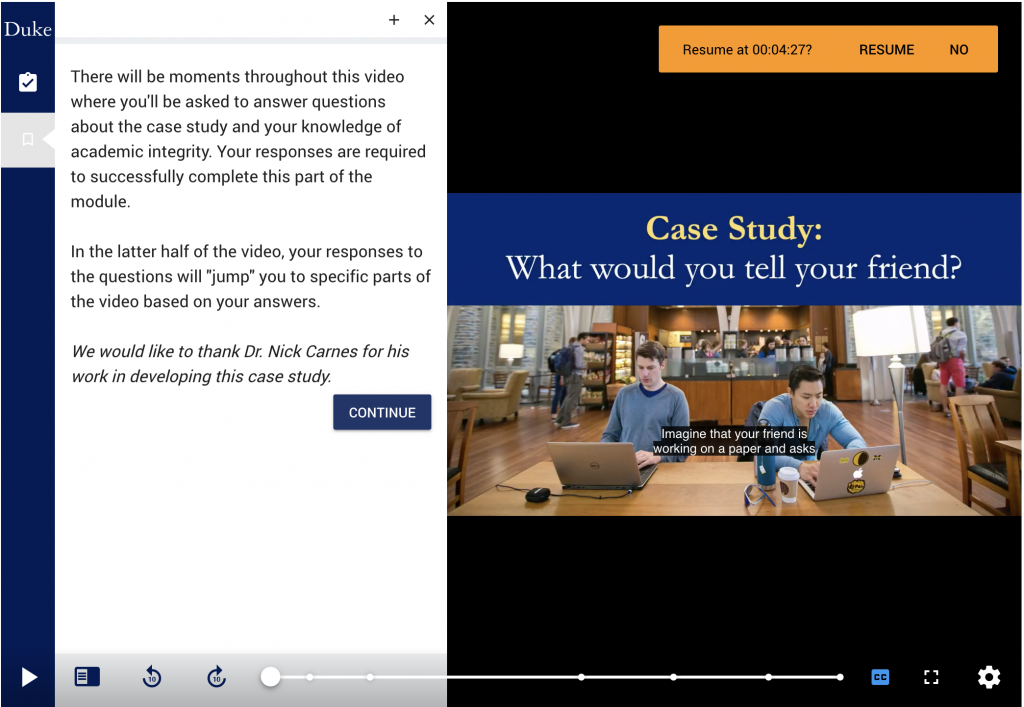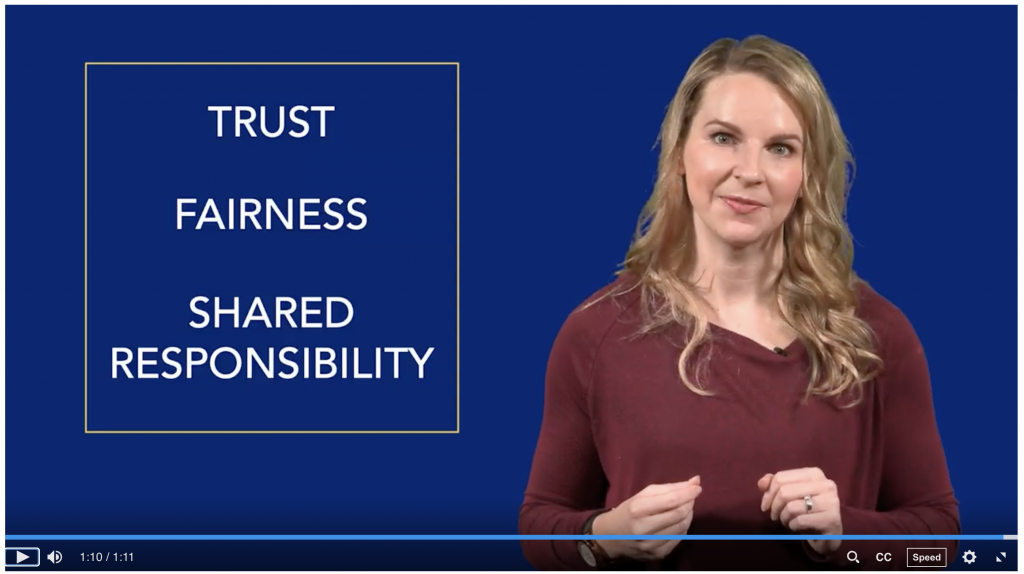When the Class of 2026 began their first semester at Duke in the Fall of 2022, they were met with a message that would shape their experience at Duke: academic integrity not only is at the heart of what students should do as undergraduates — it will be a determining factor of their success.
As Devan Desai, Duke student (Class of 2023) put it, “It is important for students to take ownership of their work and develop skills through personal experiences. Academic integrity builds characters and prepares students for the post-Duke world.”
But an important challenge facing the university is how to effectively communicate academic integrity standards to students.
To address this issue, members of Duke’s Academic Integrity Committee worked to revise the university’s online plagiarism module for first-year students, with the class of Fall 2026 as the first learners. While the previous module consisted of informative text on plagiarism and a short quiz, the members of the Academic Integrity Committee hoped to create more interactive experiences for students.
Partnering with Duke Learning Innovation, the Academic Integrity Committee worked to create a series of interactive video modules using Playposit — a tool that enables adding interactions like quiz questions or reflective pauses on top of videos. Rather than just focusing just on the technical dos-and-don’ts of academic integrity (e.g., how to use direct quotations and paraphrase), these modules emphasized how integrity also relates specifically to Duke community values.

Creating Meaningful Modules
Yue Jiang, Assistant Professor of the Practice of Statistical Science at Duke, led a diverse committee of faculty, staff, and students in the revision of the Academic Integrity modules.
Jiang said the committee had a few goals in its revision, “In no particular order, to affirm and demonstrate to students that academic integrity is of paramount importance here at Duke, and to set expectations of behavior and what the Duke Community Standard represents so all students can be on the same page coming in.”
Furthermore, Jiang said, the committee noticed the original module was focused on plagiarism, rather than the full-range of disciplinary practices students need to act with integrity in all their courses and academic activities. (For instance, the new module asks students to think about falsifying data, reusing previous assignments, correct citational practices.)
The committee also took into account how they wanted to approach teaching students about academic integrity.
“The committee’s big objective was to rethink how the Duke community teaches, learns, and practices ethical conduct in classrooms, labs, studios – all of our intellectual spaces,” said Jennifer Hill, Director of Duke’s Office of Assessment. “The need to reconstruct the outdated ‘plagiarism tutorial’ gave the committee time and space to apply more contemporary understandings of academic integrity to a specific learning module for undergraduates.”
One challenge the committee encountered was how to design these modules to be engaging. In fact, Jiang said, the students the committee talked to about the previous module did not remember completing it.
Working with Duke Learning Innovation, the committee created interactive video modules narrated by faculty across Duke, with the hope students would recognize and respond to these voices. The modules culminate in an asynchronous case study, where students are tested on their knowledge of plagiarism by responding to prompts about whether a fellow student has paraphrased correctly.

“I think the interactive videos were more engaging to students – we’ve all participated in training activities which consisted solely of reading long walls of text and taking meaningless assessments at the end,” Jiang said. “By incorporating open-ended reflection activities with no ‘right answer,’ students actually have to think and critically evaluate the situations at hand.”
Jiang identified scheduling meetings as a major challenge in this project because a diverse range of stakeholders were involved across the university — from students, to staff, to faculty, to the administration.
“Making sure that everyone’s voice was heard, valued, and incorporated into the final project involved a lot of moving parts … [I have an] immense amount of appreciation for everyone’s expertise, experiences, and time in putting this project together,” Jiang said. “Organization and setting clear goals and timelines was key to getting a finished project through production.”
To keep the modules relevant, Jiang noted that they will undergo continual improvement, and future iterations will come from stakeholder reflection to make sure that the university’s goals for academic integrity education are still being met.
These modules are particularly important now for, as Hill noted, “Faculty and instructors diffuse essential disciplinary norms within their courses and in the co-curriculum. Direct instruction in these academic responsibilities seems particularly important now as increasing numbers of students seek and navigate interdisciplinary experiences in their undergraduate years.”
What Instructors Can Do to Promote Academic Integrity
What causes students to commit academic integrity violations? And what can instructors do to support students in upholding Duke community values?
Speaking from the perspective of the Office of Assessment, Hill noted that recently Duke has implemented a new course evaluation platform called Watermark that allows instructors and departments to create customized questions.
“These custom questions can help instructors and their departments understand better the characteristics of the learning environment and whether students experience any of the known preconditions for academic dishonesty,” Hill said.
The data that Hill’s team has gathered since the onset of COVID-19 in the 2020-21 student surveys “suggests a half-dozen clear themes around which violations of the Community Standard were organized,” Hill said.
“It’s important that the Duke community remain mindful of the “whys” of academic dishonesty,” Hill said. “These include opportunism, high levels of stress, navigating the problem of collective action, and social pressures. The prevalence of these themes in students’ survey data varied by course type as well as by students’ academic identities, and each of them implies a different institutional or course-specific response.”
In addition to these reasons for committing integrity violations, students also might also not fully understand ethical guidelines in each situation on their own and need guidance. That is, while these modules lay a strong groundwork in the values that underpin academic integrity, reinforcement across courses at Duke is key to learning.
Learning Innovation has put together a guide on academic integrity for instructors that works to address some of these concerns by making suggestions such as designing assignments that make it harder for students to cheat. Additionally, it’s important to design your course inclusively, so that your students feel supported from the first day.
“I’ve never met a Duke instructor who has not cared deeply about maintaining an honest learning environment,” Hill said. “Instructors should be open to critical reflection on and discussions of students’ learning experiences, asking, among other questions, do the ways I assess learning tap into students’ intrinsic values and motivations? Have I structured course assessments that engage students authentically?”
From a student perspective, Desai noted that faculty have a role in academic integrity, “Often, students are unaware of the specific guidelines for classes, so outlining them at the beginning of every semester sets good boundaries and clear expectations for students.”
The Office of Student Conduct and Community Standards commonly sees cases of unauthorized collaboration between students — not just on high-stakes assignments like exams, said Maggie Peterson, Assistant Dean of Students in the Office of Student Conduct and Community Standards.
To counteract this before it becomes an issue, Peterson noted the importance of frequent reminders to students of course standards, as faculty have multiple opportunities to speak with students about academic integrity. This might include “explicit instructions in their syllabi, how they discuss expectations for the course, or through their own example.”
“Because students have such respect for their professors, Duke faculty may even encourage academic integrity by simply building relationships with students,” Peterson said.

Jiang similarly noted that faculty play a large role in promoting academic integrity, “Explaining the reasons for why students should care and why having integrity is important would also go a long way in making sure students know that it’s action, not just words.”
The Academic Integrity Module’s framework on why ethical academic conduct is important (which covers three key focal points — Trust, Fairness, and Shared Responsibility) can be a good starting point for these conversations, Jiang said.
Learn More
You can also contact Learning Innovation at learninginnovation@duke.edu or visit our office hours if you’d like to speak with one of our consultants about specific questions about academic integrity and your pedagogy.
If you’re interested in learning more about the mechanics of how to use Playposit, you can read a blog post from a recent project that covered this or visit Playposit’s documentation. Also, here’s a recent post we wrote on AI, plagiarism, and the assessment of student learning.
Peterson and the Office of Student Conduct and Community Standards suggest several resources for faculty:
- The Duke Community Standard
- Trinity Academic Policies and Procedures for Undergraduates
- Pratt Policies and Procedures for Undergraduate Students
- The Office of Student Conduct and Community Standards website also has further information on these topics.
The Office of Student Conduct and Community Standards provides training on the expectations outlined in the Duke Community Standard, which can be tailored to instructor needs. Faculty are welcome to request training by emailing conduct@duke.edu, Peterson said.
If you would like to learn more about the Academic Integrity modules developed for Duke first-years, you can contact Jiang at yue.jiang@duke.edu.
